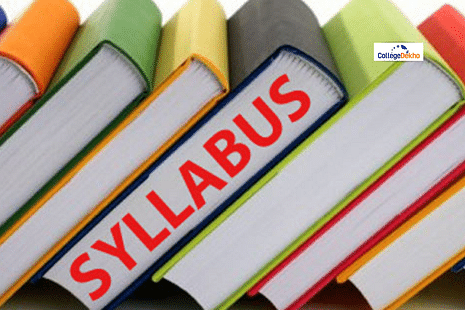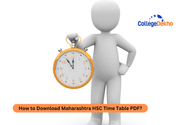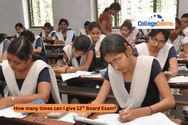

Never Miss an Exam Update
ISC Class 12 History Syllabus 2025-26:
The ISC Class 12 History Syllabus 2025-26 is available on the official website of the Council for the Indian School Certificate Examinations (CISCE). For the academic year 2025-26, the theory paper is divided into Part I and Part II, carrying a total of 80 marks, while the remaining 20 marks are allocated for project work. Part I covers topics from Indian History, whereas Part II includes questions related to World History. Further, these two parts are divided into 6 and 5 chapters, respectively. The syllabus is designed by academic experts to help students focus on essential topics and understand the exam pattern effectively.
Students can read this article to know more about the revised syllabus along with the course structure. To download the revised ISC Class 12 History Syllabus 2025-26, students can go through the article below.
ISC Class 12 History Syllabus 2025-26 PDF
The Class 12 History syllabus is an excellent resource for students who want to work in history, politics, or other humanities-related subjects. Check here ISC Class 12 History Syllabus 2025-26 PDFISC Class 12 History Revised Course Structure 2025-26
Students can check out the syllabus added below.Section A (Indian History) | |
|---|---|
Unit 1 | Towards Independence and Partition: the Last Phase (1935-1947) |
Unit 2 | Establishment and development of Indian democracy (1947 – 1966) |
Unit 3 | Challenges to Indian Democracy (1964 – 1977) |
Unit 4 | Changing face of the Indian Democracy (1977 – 1986) |
Unit 5 | India’s Foreign Policy |
Unit 7 | Movements for Women’s Rights |
Section B (World History) | |
Unit 8 | World War II |
Unit 9 | De-colonisation – in Asia (China) and Africa (Ghana & Kenya) |
Unit 10 | Cold War 1945-91– origin, course, end and impact |
Unit 11 | Protest Movements |
Unit 12 | Middle East: Israeli-Palestine conflict (1916-1993) |
ISC Class 12 History Syllabus 2025-26
The ISC Class 12 History exam consists of a total of 100 marks, which includes both theory and project work. The theory paper —comprising Part I and Part II —features a mix of short and long-answer questions from both Indian History and World History. The important chapter-wise topics from the ISC Class 12 History Syllabus 2025-26 are detailed below.Section A- Indian History |
|---|
1. Towards Independence and Partition: the Last Phase (1935-1947) |
(i) The Kisan Sabha movement's principal goals and expansion. (ii) The rise of communalism among Muslims and Hindus (1930s–1940s). (iii) Government of India Act, 1935. The key components of the 1935 Government of India Act. A review of the 1937 election. (iv) The August Offer and the Cripps Mission: The National Movement During the Second World War. Directly influencing the Quit India Resolution were the suggestions and the justifications for their rejection. (v) The INA and Subhash Chandra Bose. An overview of the INA's functioning, including Bose's organization of it, its final demise, and its significance. (vi) Transfer of power (1945-1947): Reasons for change in the attitude of the British government after World War II. Cabinet Mission: its aims and major provisions. 1947: Attlee’s Declaration of 20th February 1947; Mountbatten Plan – main features: reasons for acceptance of the Plan by major political parties. Modifications in the Indian Independence Act. |
2. Establishment of Indian Democracy (i) Sardar Patel's contribution to the restructuring and unification of princely kingdoms. (ii) Problems of integrating Junagarh, Hyderabad and Kashmir. (iii)First general election (1952): problems of preparation and their solutions, process, result and impact of the elections. (iv) The linguistic reorganization of states: A discussion of the States Reorganisation Act, 1956, with a focus on Punjab, Bombay, and Andhra Pradesh. |
3. Development of Indian Democracy (1964 – 1977) (i) Lal Bahadur Shastri – his contributions as Prime Minister (ii) Importance of the election of 1967 (iii)Main Opposition political parties and their ideologies (iv) Naxal Movement (v) JP Movement (1974-75) |
4. Changing face of the Indian Democracy (1977 – 1986) (i) The Janata Government (1977 – 1979). the Janata Government's establishment, its policies and their execution, and the causes of its overthrow. Center-State relations (a) Punjab: The demands of the Akali Dal, the Anandpur Sahib Resolution, the elections of 1977, the establishment of the Akali administration, and the ascent of Bhindranwale and his demands and strategies. Response from Center: Results and effects of Operation Bluestar. The 1985 Punjab Accord. (b) Assam: The Assam Accord, 1985, the Center's response, and the causes of Assamese discontent. (c) Nagaland: The Nagas' demands for their own state; the development of the agitation; the Shillong Accord of 1975. (d) Mizoram: The path and resolution of the Mizoram Movement (1959–1986). |
5. India’s Foreign Policy (i) Non-Aligned Movement (NAM) The reasons for maintaining a non-aligned stance during the Cold War. Establishment of NAM at the Bandung and Belgrade conferences. (ii) Pakistan (1947-49, 1965, 1971) The causes, developments, and effects of the Indo-Pak Wars will be addressed separately. (iii) Sino-Indian War Conflicts with the People's Republic of China over (a) the Tibetan question, including the Chinese occupation and the Dalai Lama's sanctuary in India; and (b) border issues. Chinese-Indian War (1962): causes and immediate repercussions. |
|
6. Movements for Women’s Rights
The objectives, relevance, and suggestions of the Towards Equality Report from 1974. developments in the 1970s and 1980s regarding the fight against domestic abuse and the anti-dowry movement. |
Section B: World History |
7. World War II (i) The aggressive foreign policies of Germany, Italy, and Japan were factors that contributed to the War. (ii) The policy of Anglo-French appeasement. Appeasement: the rationale behind and implementation of Britain's and France's policies. (iii) The Axis countries' invasion campaign in Europe and Asia (1939–1941). (iii) The causes of the Axis Powers' loss. |
8. De-colonisation – in Asia (China) and Africa (Ghana & Kenya) (i) China: A brief overview of the issues the Communists faced in 1949 should include the gradual transition from land distribution to collective farms in agriculture and the Five Year Plan and Soviet assistance in industry. More information on the Great Leap Forward, particularly on the creation of communes and evaluation of the GLF, should be provided. (ii) Ghana: democracy and dictatorship (1957- 66). Brief background to independence, Nkrumah’s role, reasons for his overthrow. (iii) Kenya: conflict and independence (1947 – 1964). Conflict with whites over independence and role of Kenyatta. |
9. Cold War 1945-91– origin, course, end and impact (i) The Truman Doctrine, the Marshall Plan, the Yalta and Potsdam Conferences, the Molotov Plan, COMECON, and Cominform are some of the factors that contributed to the Cold War's beginnings. The gap grows as a result of Soviet expansion in Eastern Europe (1945–1948), which included the communist takeover of Czechoslovakia. (ii) The dissolution of the USSR and changes in Poland, Germany, and the USSR in Eastern Europe. |
10. Protest Movements (i) Racial problems and civil rights in USA in the 1950s, 1960s and 1970s. (ii) Anti-Apartheid Movement in South Africa (1948-1994) (iii) Second Wave Feminist Movement in USA (early 1960s – early 1980’s) |
11. Middle East: Israeli-Palestine conflict (1916-1993) (i) Post War conflict in Palestine after World War I, till the formation of the state of Israel. (ii) The Arab-Israeli Wars from 1948 to Camp David Accord (1979). (iii) Oslo Peace Accords (1993). |
ISC Class 12 History Exam Pattern
The ISC History paper is divided into theory and project. The theory part of the paper contains 80 marks, and the rest 20 marks are awarded to the project. The theory paper is further segregated into two parts. Part I has 20 marks consisting of compulsory short-answer questions, and Part II includes 60 marks; students must answer five questions for 12 marks each.
| Particulars | Marks |
|---|---|
| Theory Paper | 80 |
| Project | 20 |
| Total | 100 |
Students should also check ISC Class 12 Exam Pattern 2025-26 in order to understand the marking scheme and pattern of the paper.















